Artificial Intelligence has changed the ecommerce landscape over the past decade. It started with simple, rule-based bots answering customer questions and has evolved into powerful AI agents that can understand language, personalize shopping experiences, predict customer behavior, manage inventory, and automate complex tasks. In the competitive world of online retail, finding the best AI Agents for E-commerce is now essential.
They improve customer experiences and streamline operations. This guide, titled AI Agents Explained, examines how AI agents are rising in ecommerce, their practical applications, challenges in implementation, and how to choose the right one for your business.
The Rise of AI Agents in E-commerce
The development of generative AI, natural language processing (NLP), and large language models like GPT-4 has enabled ecommerce platforms to use intelligent digital agents that think, learn, and adjust. These AI agents do much more than simple automation. They analyze customer behavior, predict buying patterns, engage in meaningful conversations, and even create original content. As customers seek more personalized and instant experiences, businesses depend on AI to scale interactions without losing quality.
This shift is driven by three main trends: access to data, improvements in algorithms, and cloud computing. With large amounts of behavioral and transactional data available, ecommerce companies can use AI models to gain insights that would otherwise take a lot of manual effort. Algorithms have improved in accuracy, and cloud platforms let businesses access advanced AI infrastructure without maintaining servers. This broadens the access to AI, allowing smaller businesses to benefit from high-level intelligence.
Key Benefits of Using AI Agents in E-commerce
AI agents are making ecommerce smarter, faster, and more efficient in measurable ways. One significant benefit is hyper-personalization. AI tools can track customer preferences and browsing habits in real-time to personalize product suggestions, email content, and promotions for each individual. This drives higher engagement and boosts conversions as customers see what they are most likely to buy.
Around-the-clock customer service is another game-changing benefit. AI chatbots and virtual assistants can handle many queries simultaneously across different time zones, allowing human agents to focus on more complex issues. This enhances response time and significantly lowers support costs.
On the backend, AI agents improve inventory management and logistics. By examining sales trends, seasonality, and customer demand, AI tools can predict which products will sell and adjust stock levels accordingly. This cuts down on overstocking, reduces losses from unsold items, and prevents missed sales from out-of-stock situations.
AI also plays a role in fraud detection. It analyzes unusual transaction patterns and flags suspicious activities before any damage occurs. In marketing, AI tools can create content, design visuals, segment audiences, and automate campaigns, resulting in quicker execution and better returns on investment.
List of Best AI Agents for E-commerce
1. Shopify Sidekick

Shopify Sidekick is Shopify’s in-house AI assistant that helps manage ecommerce stores for merchants of all sizes. It’s built into the Shopify admin interface and uses data from the user’s store to provide smart recommendations and automate tasks. These tasks include creating product descriptions, analyzing sales trends, and answering business-related questions.
Users can ask questions like “Why did my conversion rate drop last week?” or “Create a promotional email for new arrivals” and receive customized responses. The AI learns from user behavior and gets better over time. This makes it a valuable tool for store owners who want to reduce manual tasks and improve efficiency. Sidekick also integrates well with the wider Shopify ecosystem, providing a smooth experience across storefronts, inventory, and marketing tools.
Features:
- AI-powered store management and content generation
- Comprehends orders and questions in natural language
- Contextual suggestions based on real-time sales and product data
- Product description and email creation
- Embedded directly within Shopify admin
Pricing:
- Included with Shopify plans, starting at $39/month
2. Jasper AI
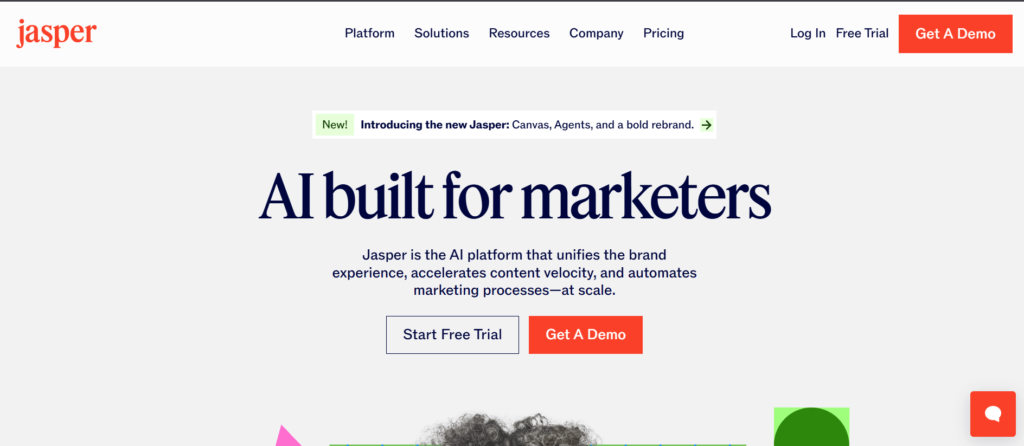
Jasper AI is a powerful content creation platform optimized for marketers, agencies, and ecommerce businesses. Using advanced language models, Jasper focuses on creating persuasive and consistent copy for product descriptions, email campaigns, paid ads, and blog content. For ecommerce stores that manage hundreds or thousands of SKUs, Jasper is invaluable.
It allows teams to produce unique product descriptions at scale while maintaining brand tone through its Brand Voice feature. Jasper also supports multiple languages, different content workflows, and team collaboration. Its user-friendly interface and campaign templates make it easy to create SEO-friendly and impactful content quickly.
Features:
- AI-driven product descriptions, ads, blogs, and email content
- Consistent brand message through brand voice and memory
- Multi-language support
- SEO optimization tools and content templates
- Team collaboration and workflow support
Pricing:
- Starts at $49/month for the Creator plan
- $125/month for Teams
3. Rebuy
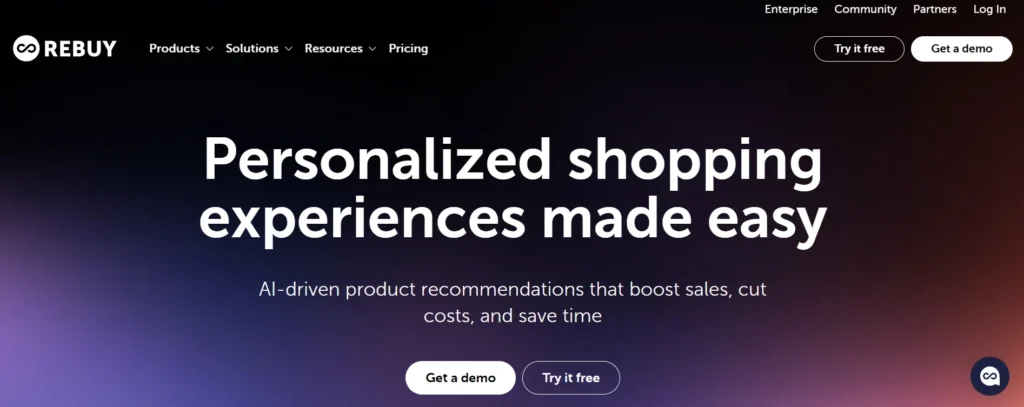
Rebuy is a personalization engine designed for ecommerce businesses that want to increase conversions, raise cart values, and improve customer experience with AI-driven product recommendations. It analyzes user behavior, purchase history, and real-time browsing activity to present smart product bundles, upsells, and personalized offers. Whether during browsing, checkout, or post-purchase, Rebuy delivers strategic interventions that feel natural and tailored.
For Shopify users, Rebuy integrates easily and provides an intuitive drag-and-drop interface for customizing widgets, rules, and display logic. Ecommerce brands appreciate Rebuy for boosting average order value (AOV) and enhancing customer retention through relevant product recommendations.
Features:
- AI-based product recommendations and upsells
- Smart cart, post-purchase offers, and checkout personalization
- Advanced analytics and A/B testing
- Shopify integration and no-code configuration
- Rules engine for custom customer flows
Pricing:
- Starts at $99/month, with usage-based pricing available
4. Tidio AI
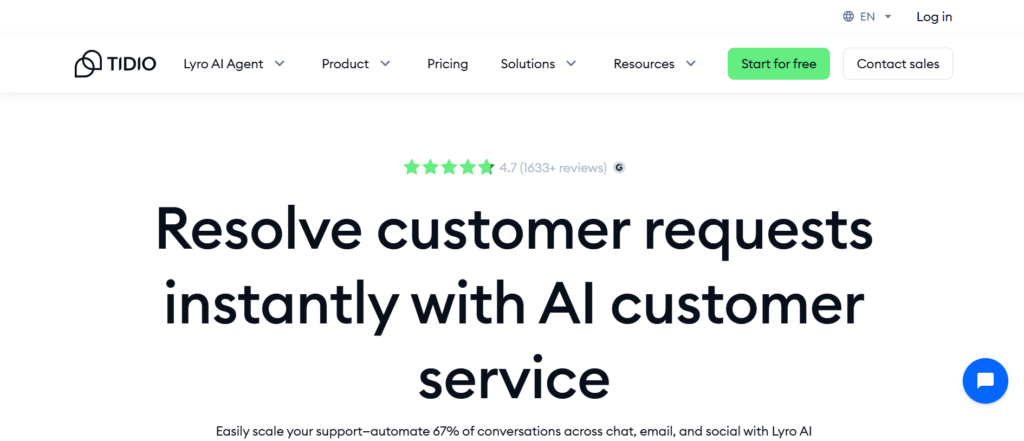
Tidio AI is a conversational AI chatbot aimed at ecommerce support and lead conversion. Using its Lyro AI engine, Tidio automates responses to common customer inquiries such as order status, shipping times, and return policies. It guides users through product discovery with conversational flows, enhancing engagement and reducing bounce rates.
Tidio effectively lowers cart abandonment by assisting visitors proactively and offering incentives at the right moments. It integrates with major ecommerce platforms like Shopify, WooCommerce, and BigCommerce, and includes AI CRM tools for lead tracking and automation.
Features:
- AI-powered live chat with automated responses
- Cart abandonment reduction and lead qualification
- Omnichannel support (Messenger, Instagram, Email, etc.)
- Connects to WordPress, Wix, Shopify, and other platforms.
- Custom chatbot templates and visitor tracking
Pricing:
- Free basic plan
- Paid plans start at $29/month
Suggested Read: eCommerce Accounting Software
5. Clerk.io
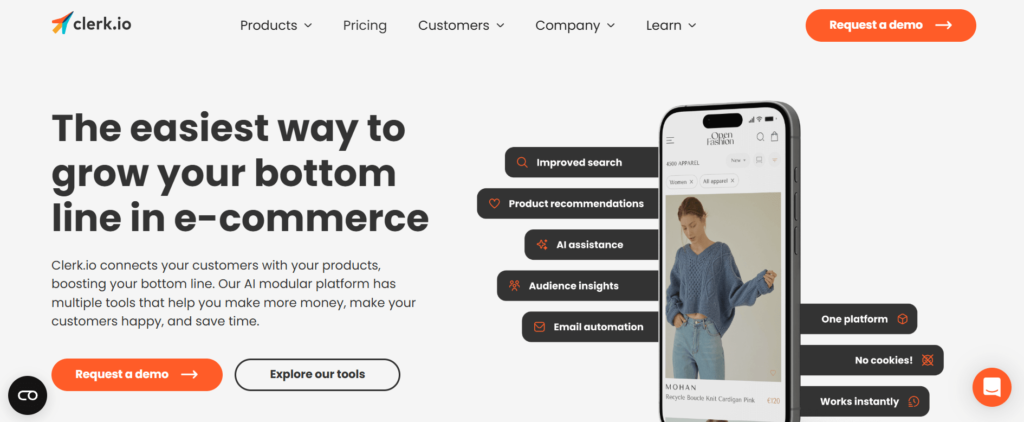
Clerk.io is an AI-powered personalization and search engine designed for ecommerce stores that want to boost sales through personalized experiences. The platform uses machine learning to track customer behavior, preferences, and intent throughout the shopping journey, providing tailored product recommendations on the site, in search, and through marketing emails.
Its predictive search algorithm helps users quickly find products, often before they finish typing their query. Clerk.io also offers email marketing tools that let stores target users with automated product suggestions based on past actions.
Features:
- Personalized product recommendations and search
- Predictive search functionality for faster product discovery
- Email automation with tailored product suggestions
- Real-time behavior tracking and AI analytics
- Easy integration with Shopify, Magento, and WooCommerce
Pricing:
- Custom quote based on site traffic and features
6. Octane AI
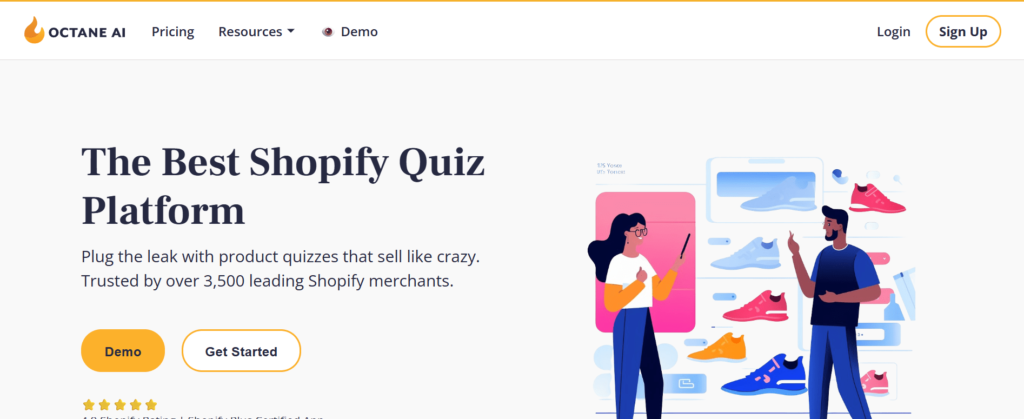
A conversational commerce platform called Octane AI uses interactive product discovery and quizzes to provide individualized purchasing experiences.. It is especially popular among beauty, fashion, and wellness brands. Octane allows stores to guide users through fun questions to find out their preferences and needs, then recommends the most relevant products.
This customer-provided data fuels targeted campaigns in CRM and email platforms like Klaviyo. The quizzes improve conversions and also help brands gather valuable data. Ecommerce brands using Shopify benefit from Octane’s easy integration and customizable interfaces.
Features:
- Interactive AI quizzes for product discovery
- Zero-party data collection for email and SMS personalization
- Deep integration with Shopify and Klaviyo
- Custom quiz logic with brand visuals and voice
- Data sync for segmentation and retargeting
Pricing:
- Starts at $50/month, with pricing increasing based on usage and features
7. Levity
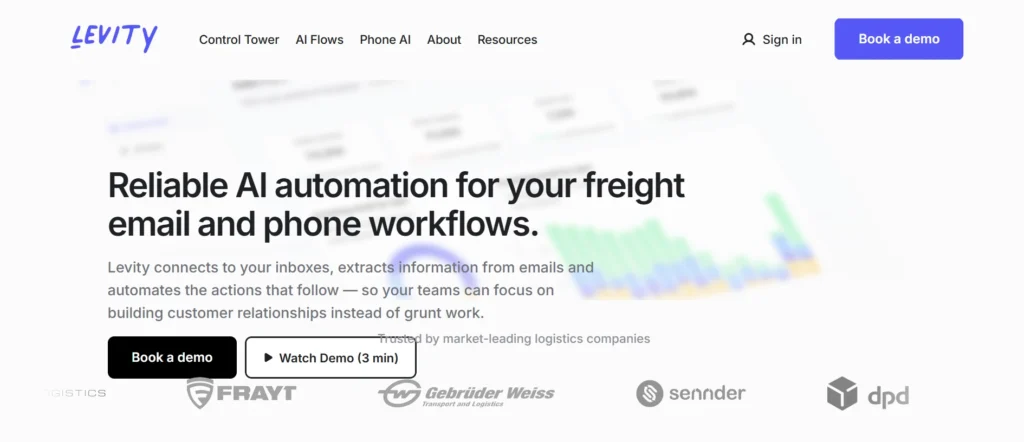
Levity is a no-code AI automation platform that helps ecommerce teams simplify repetitive backend tasks such as classifying order issues, managing emails, processing returns, and moderating reviews. Instead of using rigid rules, Levity employs machine learning models that you can train with your own data no coding needed.
It sorts support tickets by topic, urgency, or sentiment and automates routes or responses to the right team. For rapidly growing ecommerce brands, Levity is perfect for automating behind-the-scenes operations, allowing human agents to focus on more important tasks.
Features:
- No-code AI workflow builder for ecommerce operations
- Email and ticket classification based on sentiment and intent
- Custom model training with company-specific data
- Automates review moderation and return handling
- Integrates with tools like Zapier, Zendesk, and Airtable
Pricing:
- Starts at $200/month
- Offers a 14-day free trial
8. Zowie
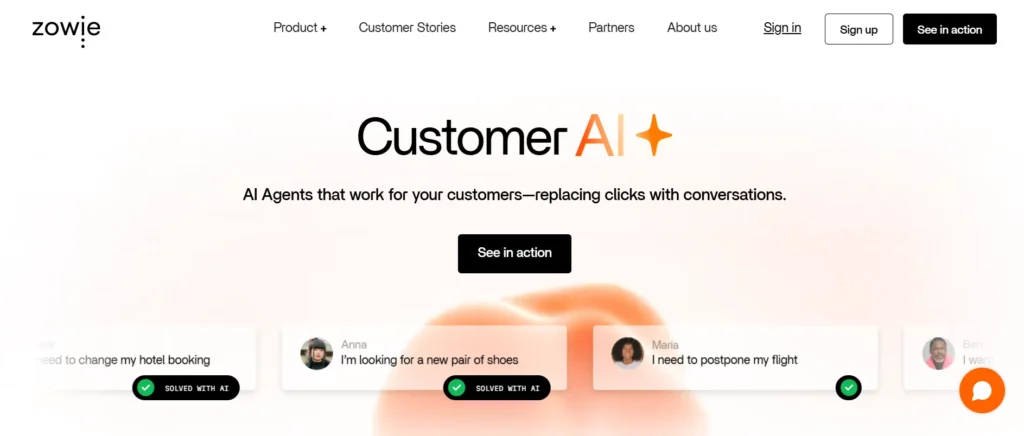
Zowie is an AI customer service automation tool designed specifically for ecommerce. Unlike generic chatbots, Zowie serves as a comprehensive support platform that resolves over 70% of customer inquiries without human intervention. It learns from historical support tickets to automate answers for common questions such as order tracking, refunds, returns, and product details.
The AI continues to improve, allowing brands to reduce response times while keeping accuracy and brand voice. Zowie also sends proactive messages to help prevent issues. It integrates seamlessly with Zendesk, Gorgias, and Shopify, making it ideal for ecommerce brands with increasing support needs.
Features:
- Ecommerce-specific customer support automation
- Learns from past tickets and FAQs
- Proactive customer communication and alerts
- Integration with Zendesk, Gorgias, and Shopify
- Reduces human agent workload by over 70%
Pricing:
- Custom pricing based on monthly ticket volume and features
9. Lang.ai
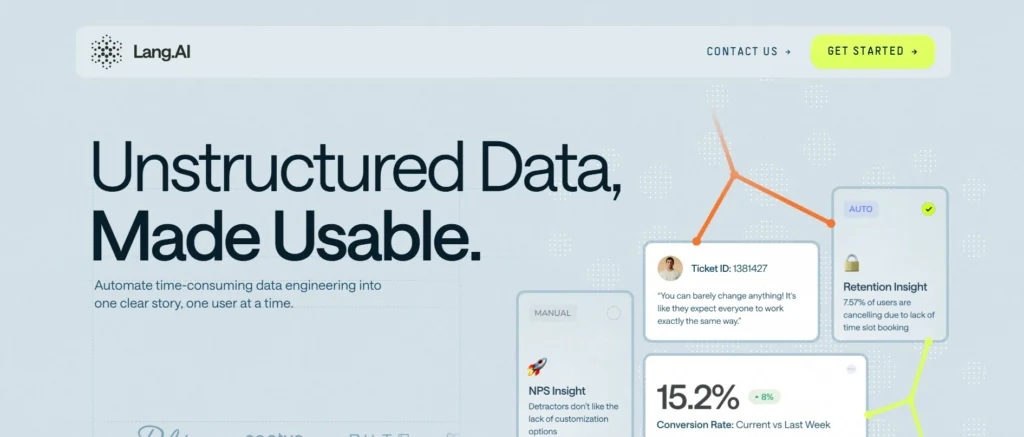
Lang.ai helps ecommerce customer support teams work more efficiently by using natural language processing (NLP) to categorize and route tickets automatically. As one of the emerging ecommerce customer support tools, Lang’s AI identifies themes, intents, and issues from the actual text of support emails or chats—instead of relying on predefined tags—speeding up triage and fostering better automation workflows.
For ecommerce stores needing multilingual support, Lang.ai’s language-agnostic models are particularly effective. It also helps brands identify emerging issues in real time, like shipping delays or defective products, without requiring manual data analysis.
Features:
- AI-powered ticket tagging and classification
- No manual rule creation—learns from ticket content
- Supports multiple languages and large teams
- Identifies trends and emerging support issues
- Integrates with Zendesk, Salesforce, and other CRMs
Pricing:
- Custom enterprise pricing
10. PostCo AI Returns

PostCo is an AI-powered returns management platform that turns the challenging process of returns and exchanges into a chance for retention. The AI engine suggests exchanges based on customer history, available inventory, and size or fit preferences, helping brands reduce refunds and boost customer satisfaction.
PostCo allows customers to initiate returns through branded portals and uses AI to suggest alternative products during the process, keeping revenue within the system. It integrates with major platforms like Shopify, WooCommerce, and Magento, creating a smooth and automated post-purchase experience.
Features:
- AI-recommended product exchanges during return flows
- Branded, customer-facing return portals
- Integrations with ecommerce and 3PL platforms
- Analytics dashboard for monitoring return patterns
- Works across APAC, US, and EU logistics hubs
Pricing:
- Quote-based pricing depending on monthly return volume.
11. Vizit
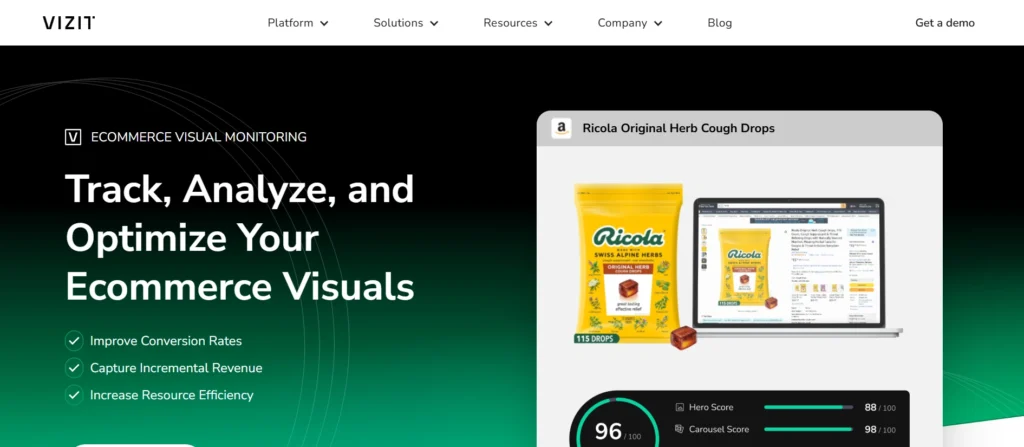
Vizit is a product image optimization tool and visual intelligence platform that uses AI to analyze product images and predict which visuals will perform best with specific audiences. Designed for ecommerce brands and marketplaces, Vizit helps companies select, optimize, and A/B test their product photos for maximum conversion. The AI scans millions of data points across verticals, including lighting, facial expressions, product positioning, and color schemes.
It determines which image will resonate most with a target demographic. Brands use Vizit before launching to improve listings, boost CTRs, and enhance ROI from ad campaigns. It’s particularly useful for brands competing in visually driven categories like apparel, beauty, and consumer electronics.
Features:
- Predictive AI scoring of ecommerce product images
- Visual intelligence dashboard with performance insights
- Real-time A/B testing for visual content
- Audience segmentation based on visual preferences
- Optimized for Amazon, Shopify, DTC stores
Pricing:
- Enterprise-level pricing available on request
12. Yotpo
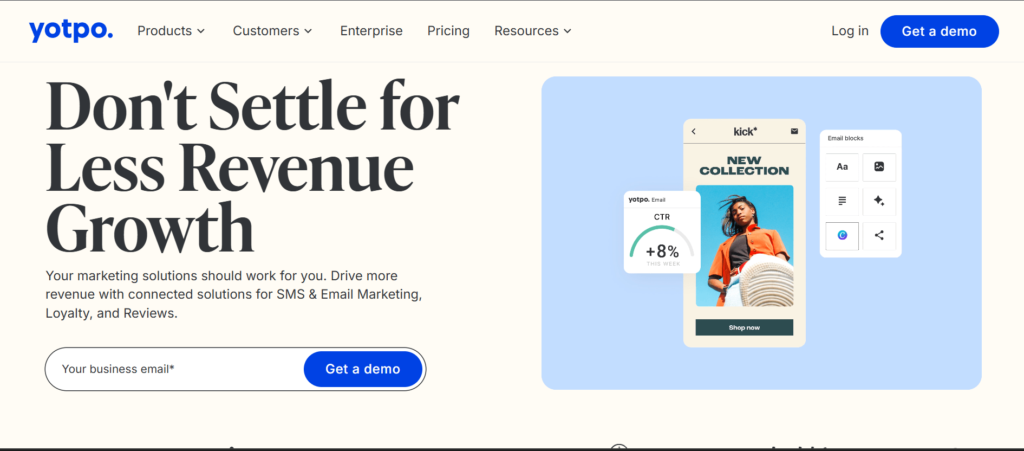
Yotpo is a multi-functional ecommerce marketing platform that uses AI to simplify review collection, loyalty programs, and SMS/email marketing. Its AI agents analyze customer reviews and feedback to extract valuable sentiment data. This enables stores to highlight top-performing products and customer experiences. Yotpo’s automated review requests and UGC curation tools help brands build trust and drive conversions without manual work.
The AI also supports loyalty segmentation and campaign optimization, ensuring repeat customers are nurtured effectively. It integrates well with platforms like Shopify, BigCommerce, and WooCommerce, making it an essential tool for ecommerce retention and engagement.
Features:
- AI analysis of reviews and customer sentiment
- Automated UGC collection and review requests
- Loyalty and referral program builder
- AI-segmented SMS and email marketing
- Integrates with major ecommerce platforms
Pricing:
- Free plan available
- Premium plans start at $15/month (loyalty & SMS pricing scales by usage)
13. ChatGPT API (OpenAI)
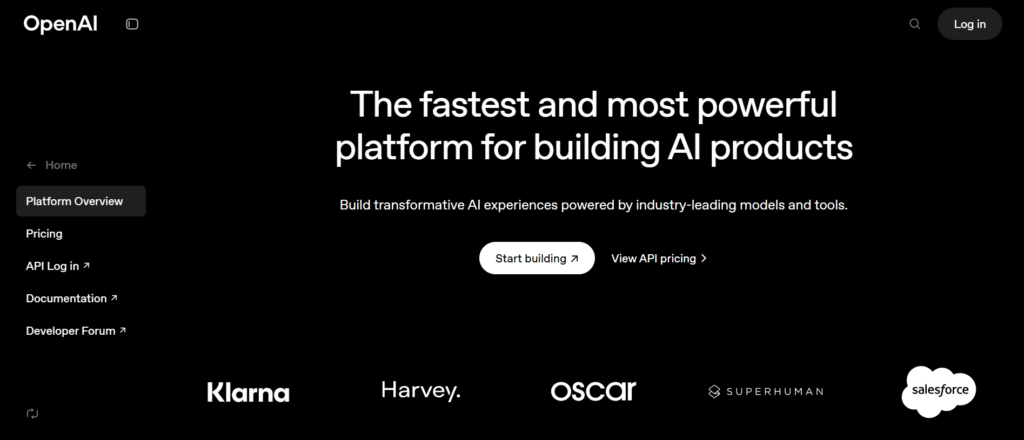
The ChatGPT API by OpenAI allows ecommerce developers to embed conversational intelligence directly into websites, apps, and customer support channels. It can be trained on specific brand data to act as a virtual shopping assistant, answering product questions, upselling based on browsing history, or resolving common support queries through natural dialogue.
Unlike traditional scripted bots, ChatGPT adapts to user context and can hold fluid conversations across various topics. This flexibility makes it ideal for ecommerce platforms that want to provide scalable, intelligent customer interaction without losing personalization. It also supports multilingual interactions, making it a strong choice for global ecommerce brands.
Features:
- Custom AI chatbot trained on brand/product data
- Natural conversation with GPT-4 or GPT-4o
- Scalable through API to millions of interactions
- Supports voice, text, and multilingual modes
- Easily integrated into websites or mobile apps
Pricing:
- Starts at $0.0015 per token for GPT-4o usage via OpenAI’s API
14. Drift
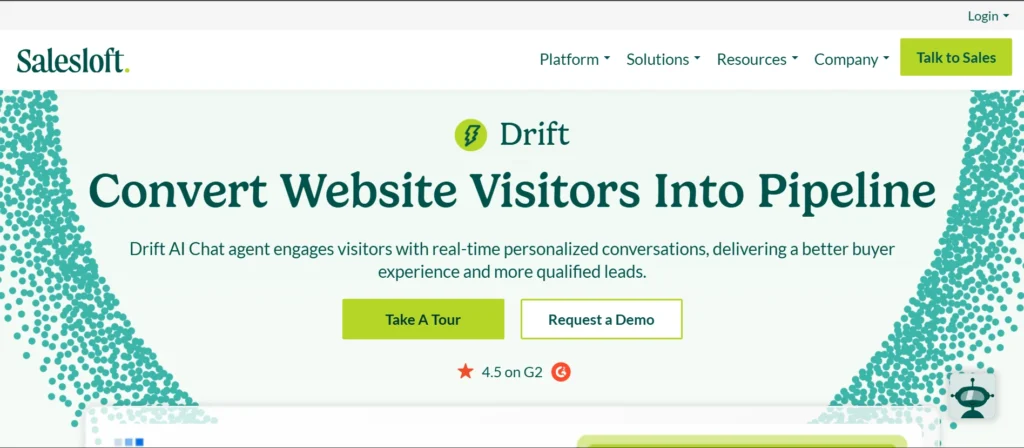
Drift is a conversational AI platform designed to convert website visitors into qualified leads and buyers through intelligent chat and lead scoring. For ecommerce businesses, Drift automates customer interactions by answering product questions, recommending SKUs, and offering time-sensitive discounts all in real time.
Its AI chatbot can identify high-intent visitors and proactively start conversations, which reduces bounce rates and improves sales conversions. Drift is also customizable, allowing ecommerce brands to create conversation flows or use AI to adjust dynamically based on user input. Its integration with CRMs and ecommerce analytics tools gives it a significant advantage in the ecommerce sales process.
Features:
- Real-time AI chat for product inquiries and promotions
- Lead scoring and conversion-based triggers
- Dynamic messaging based on user behavior
- CRM connectors with HubSpot, Salesforce, and other platforms.
- Personalized buyer journeys for ecommerce
Pricing:
- Custom pricing based on traffic volume and use case; demo required
15. ShopIQ Commerce Copilot

ShopIQ Commerce Copilot is a purpose-built AI agent that streamlines ecommerce workflows across marketing, inventory, customer support, and product management. Designed specifically for D2C brands, ecommerce founders, and small to mid-sized teams, ShopIQ acts as a centralized intelligence layer over your store’s backend. From generating ad creatives to updating product catalogs,
it uses conversational inputs to carry out complex store operations without manual effort. ShopIQ integrates with Shopify and other platforms to help automate campaign launches, optimize listings, manage offers, and provide AI-powered customer insights. Its unified interface allows users to ask natural-language questions like “What products are running low?” or “Can you launch a 10% promo on slow-moving items?”, making it function like a true operations assistant for ecommerce brands.
Features:
- AI assistant for marketing, inventory, and campaign automation
- Ad creative and copy generation for Meta, Google, and Amazon ads
- Natural-language product updates and catalog management
- Smart promo creation and product bundling suggestions
- Integrates with Shopify, WooCommerce, and major ecommerce tools
Pricing:
- Starts at $49/month for Pro users
- Enterprise pricing available upon request
Future Trends: What’s Next for AI in Ecommerce?
The role of AI in ecommerce is set to grow in the coming years. One major trend is the rise of multimodal AI agents—tools that can interpret text, images, voice, and video. This will enable richer customer interactions, such as voice-enabled shopping assistants, visual product searches, and AI-guided augmented reality try-on experiences.
Another trend is predictive ecommerce, where AI predicts customer needs ahead of their searches. Based on browsing history, environmental signals, and previous purchases, AI agents will proactively recommend, discount, or bundle products, making ecommerce more anticipatory than reactive.
We are also likely to see more autonomous agents that do not just assist but make decisions on their own. For instance, an AI agent could launch a flash sale when it predicts low traffic or reorder stock when levels drop below a certain point without needing human approval.
Finally, as AI becomes more integrated, ethical governance will be essential. Ecommerce brands will need to find a balance between personalization and privacy, automation and empathy, and optimization and fairness.
Challenges and Limitations of AI in E-commerce
Despite the significant advantages of AI agents, there are challenges to consider. One key barrier is data quality. AI models perform best with high-quality data. Incomplete, skewed, or inaccurate datasets may result in subpar forecasts or client experiences.. For example, an AI agent trained only on the behaviors of male customers may make poor suggestions for female users, which can result in lost sales.
Another limitation is the cost and complexity of implementation. While many tools offer easy integration, incorporating AI into existing ecommerce platforms often requires technical skills, strong APIs, and internal readiness. Smaller businesses may find it challenging to meet these requirements unless they opt for straightforward tools.
Over-reliance on automation presents another concern. Although automating support and marketing can free up time, AI lacks human empathy and creativity in certain situations. This makes it unsuitable for dealing with sensitive complaints, complex questions, or creating genuine emotional connections with customers.
Moreover, privacy issues are becoming more prominent, especially regarding how data is collected and used by AI systems. Regulations like GDPR and CCPA require ecommerce companies to be transparent and compliant, which can slow AI deployment or necessitate frequent audits.
How to Choose the Best AI Agent for Your E-commerce Store
With many AI tools available, selecting the right one for your ecommerce business requires careful thought. Start by pinpointing your main pain points. Are you having trouble with inventories, low conversion rates, delayed content production, or a high volume of customer service? The right AI tool should address a specific problem and provide measurable improvements.
Consider platform compatibility as well. Some AI agents are built specifically for platforms like Shopify, WooCommerce, or Magento, while others offer API access for custom setups. Ensure that the tool integrates smoothly with your existing ecommerce systems, such as your CRM, CMS, marketing automation tool, or payment processors.
Scalability is another important factor. Look for solutions that can grow alongside your business. A tool that works well for 1,000 products may struggle with 50,000. Ensure the AI agent can handle larger amounts of data, users, and channels as your operation expands.
Don’t overlook ease of use and onboarding. Many ecommerce owners may not be tech-savvy, so user-friendly dashboards, templates, and documentation are crucial. Tools with built-in guides, live support, and active user communities make the adoption process smoother.
Finally, consider your budget. Some AI agents focus on larger enterprises and come with high costs, while others offer flexible pricing options. Compare the price with the value the tool provides. If an agent saves you 40 hours of manual work each month or increases sales by 20%, the return on investment will be clear.
Conclusion
AI agents are now essential to the success of modern ecommerce. From automating customer service to optimizing pricing and personalizing every interaction in the customer journey, AI tools have become indispensable. As technology continues to progress, businesses that embrace AI will not only save time and money but also provide exceptional customer experiences that set them apart from competitors.
However, successful adoption requires more than just signing up for a tool. It demands strategic planning, precise data, and a commitment to continuous improvement. Whether you are a startup looking to grow or an established retailer aiming to optimize, AI agents can deliver great value when used effectively. The key is choosing a solution that meets your goals, integrates well with your systems, and offers clear returns on investment. As ecommerce moves forward with AI-driven advancements, those who act now will lead the way in the future.
FAQs
Q. How do I choose the best AI agent for my ecommerce store?
Start by identifying your pain points (e.g., support, conversions, marketing) and choose an AI tool aligned with that function. Evaluate features, ease of integration, pricing, and support to make the best choice.
Q. Do AI ecommerce agents work with platforms like Shopify or WooCommerce?
Yes, most AI agents are built to integrate with popular ecommerce platforms like Shopify, WooCommerce, BigCommerce, and Magento via plugins, APIs, or native apps.
Q. Can AI help with ecommerce content creation?
Yes. Tools like Jasper and Copy.ai can generate product descriptions, blog posts, ad copy, and even emails tailored for ecommerce audiences, saving teams hours of manual writing.
Q. What are the risks of using AI in ecommerce?
Risks include poor personalization due to bad data, incorrect product recommendations, privacy concerns, over-automation, and occasional AI “hallucinations” or errors in generated content. Proper oversight and testing can mitigate these.

